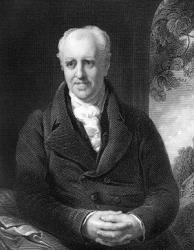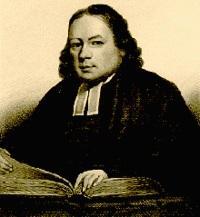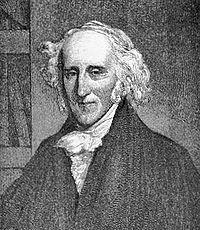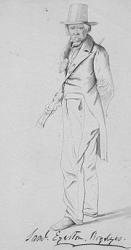Planning worship?
Check out our sister site, ZeteoSearch.org,
for 20+ additional resources related to your search.
- |
User Links
Person Results
‹ Return to hymnal




Export as CSV
William Kingsbury
1744 - 1818 Person Name: Rev. William Kingsbury, 1744-1818 Hymnal Number: 1247 Author of "Great Lord of all Thy churches, hear" in The Clifton Chapel Collection of "Psalms, Hymns, and Spiritual Songs" Born: July 12, 1744, Bishopsgate Street, London, England.
Christened: August 12, 1744, Poultry Chapel, Camomile Street Independent Church, London, England.
Died: February 18, 1818, Caversham, Southampton, England.
Kingsbury, William, was born in 1744, educated at an Independent academy in London, and became Pastor of the ancient Congregational Church, Above Bar, in Southampton, where he died in 1818, after an honourable and useful ministry of fifty-four years. He was the author of several published sermons and pamphlets, including:—(1) A Sermon on the King's recovery, 1780; (2) The Manner in which Protestant Dissenters perform Public Worship represented and vindicated, 1796; (3) An Apology for Village Preachers, 1799; (4) A Funeral Sermon on the Death of the Rev. Mr. Towle, 1807, &c.
Kingsbury was one of the ministers under whose patronage Dobell published his New Selection, 1806, and to that book contributed two hymns.-—"Great Lord of all thy churches, hear!" No. 213 (Divine Worship), and "Let us awake our joys," No. 100 (Jesus the King). Both these hymns are in common use, the second being specially popular in America. [Rev. W. R. Stevenson, M.A.]
--John Julian, Dictionary of Hymnology (1907)
William Kingsbury
George Crabbe

1754 - 1832 Person Name: Rev. George Crabbe, 1754-1832 Hymnal Number: 465 Author of "Pilgrim, burdened with thy sin" in The Clifton Chapel Collection of "Psalms, Hymns, and Spiritual Songs" Crabbe, George, LL.B., born at Aldborough, Suffolk, Dec. 24, 1754, and educated for the medical profession, but after practising for a short time, he turned his attention to literature, and subsequently took Holy Orders. He was successively Curate of Aldborough and of Stathern, and Incumbent of Evershot, Mirston and Trowbridge. Died at Trowbridge, Feb. 3, 1832. He received his degree from the Archbishop of Canterbury.
Although well known as a poet, his hymns are very few, and but little known. His works include The Village; The Parish Register, 1807; and others. From The Parish Register, his hymn, "Pilgrim, burdened with thy sin" (q.v.) is taken. Crabbe's collected Works were published, with a Memoir, by his son, in 1834.
--John Julian, Dictionary of Hymnology (1907)
George Crabbe
Claude de Santeul
1628 - 1684 Person Name: Santolius Maglorainus, 1628-1684 Hymnal Number: 1121 Author of "Blest Trinity, from mortal sight" in The Clifton Chapel Collection of "Psalms, Hymns, and Spiritual Songs" Santeüil, Claude de, elder brother of Jean-Baptiste de Santeüil, was born in Paris, Feb. 3, 1628. He became a secular ecclesiastic of the Seminary of St. Magloire, Paris, whence he was also known under the Latin-ized form of his name as Santolius Maglorianus. He died Sept. 29, 1684. Like his brother, he was a good writer of Latin poetry, and some hymns by him were included in the Cluniac Breviary, 1686, and the Paris Breviaries of 1680 and 1736. Some of these hymns have been translated into English, and are in common use in Great Britain. [George Arthur Crawford, M.A.]
--John Julian, Dictionary of Hymnology (1907)
Claude de Santeul
Thomas Coke

1747 - 1814 Person Name: Rev. Thomas Coke, 1747-1814 Hymnal Number: 618 Author of "My Hope, my All, my Saviour, Thou!" in The Clifton Chapel Collection of "Psalms, Hymns, and Spiritual Songs" Thomas Coke (9 September 1747 – 2 May 1814) was the first Methodist Bishop and is known as the Father of Methodist Missions.
Born in Brecon, south Wales, his father was a well-to-do apothecary. Coke, who was only 5 foot and 1 inch tall and prone to being overweight, read Jurisprudence at Jesus College, Oxford, which has a strong Welsh tradition, graduating Bachelor of Arts, then Master of Arts in 1770, and Doctor of Civil Law in 1775. On returning to Brecon he served as Mayor in 1772.
Ordination
In the same year as his mayoralty he was ordained in the Church of England and served a curacy at South Petherton in Somerset. He had already allied himself with the Methodist movement and this made for trouble when a new Rector arrived in the parish. Coke had begun to hold cottage services and open services of the sort promoted by Wesley. He was dismissed from his post on Easter Sunday 1777 and his parishioners celebrated at the Rector's behest by ringing the church bells and opening a hogshead of cider. He returned to Petherton in 1807 and preached to a crowd of 2,000.
He met John Wesley in August 1776, becoming one of his closest assistants. Wesley called Coke "the flea" because he seemed always to be hopping around on his missions.
He was appointed Superintendent of the London District in 1780 and President of the Methodist Church in Ireland in 1782 - a function he was to serve many times in the coming decades.
Voyage to America
Following the American Revolution most of the Anglican clergy who had been in America came back to England. Wesley asked the Bishop of London to ordain some ministers for the New World, but he declined. At this point Wesley was still an Anglican and he therefore considered only a canonically consecrated bishop capable of conferring Holy Orders. However, in 1784 Wesley consecrated Coke as the Superintendent, a title soon replaced by that of Bishop (Greek episkope) in spite of Wesley's strong disapproval. Since Coke was already a priest (Greek presbuter) or presbyter in the Church of England, some interpret this consecration as the equivalent of episcopal consecration. He set sail for New York; during the voyage he read Augustine's Confessions, Virgil's Georgics, biographies of Francis Xavier (Jesuit missionary to India) and David Brainerd (Puritan missionary to North American aboriginals), and a treatise on episcopacy. A conference of Methodist preachers was held at Baltimore at which Coke and Francis Asbury were elected bishops and the Church was constituted as an independent body under the name of the Methodist Episcopal Church. On 27 December 1784 Coke ordained deacons and presbyters and consecrated Asbury bishop: they are regarded as having been jointly the first Bishops and Superintendents of the Methodist Church in America (the American Conference formally endorsed the title of Bishop in 1787).
Other voyages
Coke returned to England in June 1785 and made eight further visits to America until he made his final visit in 1803. While in America he spoke out against slavery and wrote a letter on the subject to George Washington. Washington met Coke twice and even invited him to preach before the United States Congress. After spending some months travelling throughout Great Britain and Ireland Coke made his first mission to the West Indies in 1786, making further visits in 1788-89, 1790, and 1792-93.
Death of Wesley
Following Wesley's death in 1791 Coke became Secretary to the English Conference, having been widely supposed to be Wesley's desired successor. He was President of the Conference in 1797 and 1805, on both occasions trying to persuade the Conference to confer on him the official title of Bishop.
More voyages
In the same year he went to Paris and preached in French. He established a mission in Gibraltar in 1803 and then spent five years travelling in the cause of Methodist missions, including visiting Sierra Leone. He promoted others in setting up missions in Canada and Scotland.
Marriages
In 1805, at the age of 58, Coke married Penelope Smith, a wealthy lady who happily spent her personal fortune furthering the missions. She travelled with him until her death. In 1811 he married for a second time and his wife died the following year.
Death of Coke
He hoped to open Methodist missions in the East Indies and at his own expense he set sail for Ceylon on 30 December 1813. He had in fact tried to persuade the Prime Minister, Lord Liverpool, to appoint him to an Indian bishopric in the Church of England (the appointment of Church of England bishops being then, as now, a prerogative exercised by the Prime Minister on behalf of the Sovereign). However, Coke died after four months at sea on the way to Ceylon (Sri Lanka).
Asbury described Coke as "a gentleman, a scholar, a bishop to us; and as a minister of Christ, in zeal, in labours, in services, the greatest man in the last century."
Publications
Coke's publications included a Commentary of the Bible (1807), A History of the West Indies (3 volumes, 1808–11), History of the Bible, Six Letters in Defence of the Doctrine of Justification by Faith, Four Discourses on the Duties of a Minister, and a Preacher's Manual, as well as, jointly with collaborators including Henry Moore, a Life of Wesley (1792).
--en.wikipedia.org/
Thomas Coke
James Freeman

1759 - 1835 Person Name: Rev. James Freeman, 1749-1835 Hymnal Number: 1386 Author of "Lord of the worlds below" in The Clifton Chapel Collection of "Psalms, Hymns, and Spiritual Songs" Freeman, James, D.D. Born at Charlestown, Mass., April 22, 1759, and graduated at Harvard, 1777. He was "the first avowed preacher of Unitarianism in the United States.” In 1782 he was "Reader" in King's Chapel, and assisted or guided that historic parish in its change from Episcopacy to the then new ways in teaching and discipline. In 1787 he was "ordained," and retained the pastorate of the King's Chapel till 1826. He altered its Liturgy, and prepared for its use the King's Chapel Collection of Psalms & Hymns, 1799. Died Nov. 14, 1835. His hymn, "Lord of the worlds below," is based on Thomson's "Hymn on the Seasons." It appeared in the Psalms & Hymns, 1799, and is found in various collections. Original text in Putnam's Singers and Songs of the Liberal Faith,1875. [Rev. F. M. Bird, M.A.]
--John Julian, Dictionary of Hymnology (1907)
James Freeman
Samuel E. Brydges

1762 - 1837 Person Name: Sir Samuel E. Brydges, 1762-1837 Hymnal Number: 101 Author of "Archangels, fold your wings" in The Clifton Chapel Collection of "Psalms, Hymns, and Spiritual Songs"
Samuel E. Brydges
Roswell Park
1807 - 1869 Person Name: Rev. Roswell Park, 1807-1869 Hymnal Number: 1214 Author of "Jesus spreads His banner o'er us" in The Clifton Chapel Collection of "Psalms, Hymns, and Spiritual Songs" Park, Roswell, D.D., of the Protestant Episcopal Church, was born at Lebanon, Connecticut, Oct. 1, 1807, and educated at Union College and West Point. Previous to receiving Holy Orders he was in the army, and also held the appointment of Professor of Chemistry in the University of Pennsylvania. He was ordained in 1843, was President of Racine College, Wisconsin (1852-59), Chancellor of the same College (1858-63); and Principal of a school in Chicago from 1863 to his death. He died at Chicago, July 16, 1869. He published Sketch of West Point, 1840; Pantology, 1841; Handbook for European Travel, 1853; and Poems, 1836. His best known hymn is for Holy Communion. It begins "Jesus spreads His banner o'er us," and was published in his Poems, 1836. It is in common use in Great Britain and America. [Rev. F. M. Bird, M.A.]
-- John Julian, Dictionary of Hymnology (1907)
Roswell Park
Samuel Dowse Robians
Person Name: Rev. Samuel D. Robians, 1812- Hymnal Number: 1208 Author of "Saviour, when Thy bread we break" in The Clifton Chapel Collection of "Psalms, Hymns, and Spiritual Songs"
Samuel Dowse Robians
Lucius Manlius Sargent
1786 - 1867 Person Name: Lucius M. Sargent, 1786-1867 Hymnal Number: 1259 Author of "Bondage and death the cup contains" in The Clifton Chapel Collection of "Psalms, Hymns, and Spiritual Songs" Sargent, Lucius Manlius. (Boston, Massachusetts, June 25, 1786--June 2, 1867, Boston). A layman of independent mans, author of many articles advocating temperance. His temperance hymn beginning "Slavery and death the cup contains" was written during the Washingtonian Temperance Revival and appeared in Adams' and Chapin's Unitarian Hymns for Christian Devotion (Boston, 1846). In the American Methodist Episcopal Hymnal (1878), the first line is altered to read "Bondage and death the cup contains." The hymn is included, with the original wording, in the Universalist Church Harmonies (1895).
--Henry Wilder Foote, DNAH Archives
Lucius Manlius Sargent


 My Starred Hymns
My Starred Hymns


